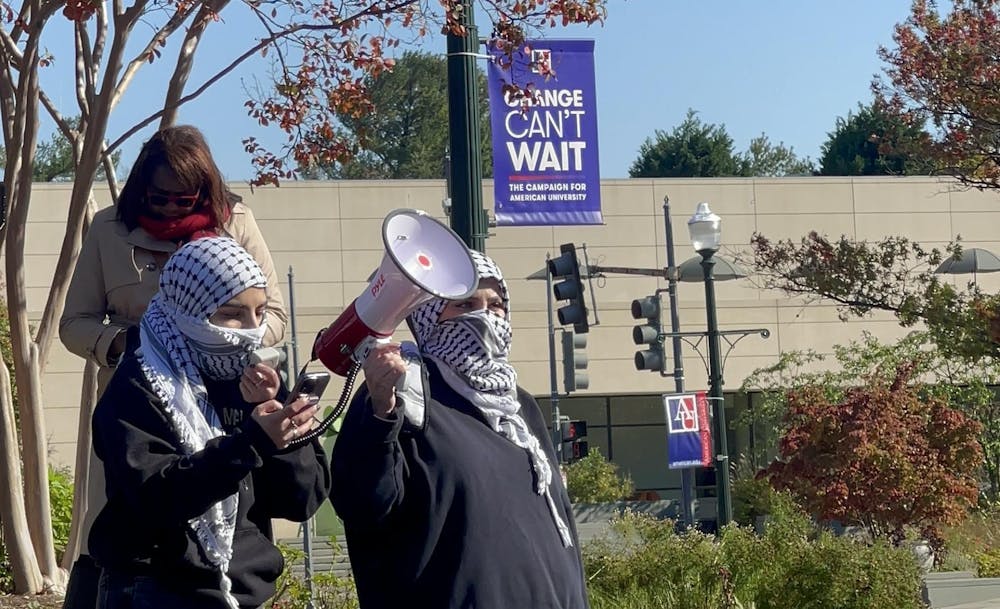The new policy comes in response to a number of student-led protests regarding the conflict in Gaza. The policy was announced in an email where President Sylvia Burwell also openly condemned Anti-Semitism. Members of the American University Students for Justice in Palestine – or AU SJP – felt the email came in direct opposition to their efforts.
“Now with Burwell’s new policies, she’s actively silencing us, and I feel like I could be disciplined at any moment for supporting Palestine,” an anonymous member of Students for Justice in Palestine said.
The AU SJP held a rally on the quad in conjunction with other student organizations to protest the new policy. Frustration is not only coming from Palestinian students. The student organization Jewish Voices for Peace cosponsored the event and has also voiced their dissatisfaction with the new policy. Samantha Merar-Obsorne, a member of Jewish Voices for Peace, says the new policy will negatively impact student rights.
“I think it does infringe on people’s rights to freely protest. Especially in DC, it gets cold in the winter,” Merar-Osborne said. “I think in the middle of winter saying you can’t protest in buildings is a bit odd.”
In response to the new campus policy, the Project on Civil Dialogue organized a student-faculty dialogue where members of the AU community could freely express their thoughts. During the meeting, Washington College of Law professor Marissa Ditkowski shared her opinion.
“There are a lot of implications for any protest really, it’s going to feel inherent at any given protest that someone will not feel welcomed,” Ditkowsky said during the dialogue. “Protests are always against something.”
Multiple students present, who to remain anonymous, assert that the policy acts as a defense mechanism following a recent lawsuit launched against the university by the Louis D. Brandeis Center for Human Rights Under Law for failing to respond to Anti-Semitism on behalf of Jewish AU students. One student shared, “I don’t think it is coincidental that the policy was announced 8 days after the lawsuit was filed.”
The lawsuit cites an event of Anti-Semitism dating back to 2022 in which a Swastika was drawn on the stall of a campus restroom as evidence of violations of the Civil Rights Act of 1964 and Title VI.
The most recent claim of the university’s failure to respond to Anti-Semitism detailed in the complaint was that the university allowed a Pro-Palestinian protest to take place indoors on November 9, 2023. The students represented in the lawsuit described the protest as disruptive to their ability to engage in their classes and obstructed the free flow of movement throughout campus.
The lawsuit claims AU has only properly responded to acts of Anti-Palestinian sentiment after a Palestinian faculty member was sent a hateful note, while failing to address events of Anti-Semitism. Since 2021, AU Administration has issued over 12 announcements mentioning Anti-Semitism and exactly 4 announcements mentioning Palestine or Anti-Palestinian actions.
“I think the policy against indoor protest comes at a very telling time where the university has been silent against anti-Palestinian sentiment,” said SJP member Lily Song in an interview after the dialogue event. “It’s very revealing that the university has, in fact, failed to bring up issues of anti-Semitism in the past until it serves to further their agenda in this particular moment.”
Recently, AU professors have spoken out against the vagueness of the policy and how it will impact their work. “At this time, American University does not need to be punishing the very students (and staff and faculty) who bring or seek Palestinian perspectives. This ‘Palestinian exception’ has long been counterproductive to our educational mission and to public good at large,” shared SIS professor Dr. Garrett Graddy-Lovelace with the BP. “As the months go on, and the situation in Gaza becomes more dire and as the US silence/silencing more flagrant, it becomes pedagogical malpractice.”
Despite the new policy, both members of the American University Students for Justice in Palestine and Jewish Voices for Peace say they remain committed to their activism and hope the administration will recognize their side of the issue.
“At this point, the time of us talking to admin and trying to convince them is over. They know where we stand, and they know what our demands are,” an anonymous member of Students for Justice in Palestine said. “Now it’s up to them to take initiative, and to send out an email exclusively dedicated to Palestinian, Muslim, Arab students saying that ‘we are dedicated to protecting you.’”

Amira Tripp Folsom is the Co-Editor-in-Chief of the Blackprint. Amira is a fourth year International Relations and Economics double-major with a minor in African American and African Diaspora Studies from Portland, Oregon. Amira joined the Blackprint as a sophomore to launch her podcast The Other Side of DC and to serve as the Editor of the Multimedia section. Amira has contributed articles and multimedia content to each of the Blackprint's Zines since joining The BP in addition to training the members of her section on how to create multimedia content. Amira loves being a part of The BP because "it is all about uplifting Black voices on campus and sharing our talent with the world!"



